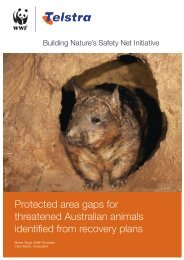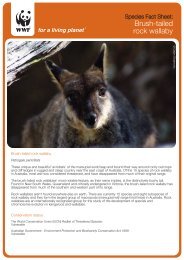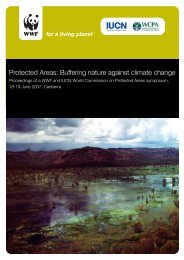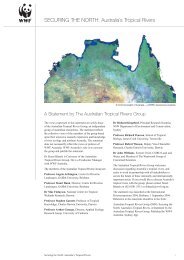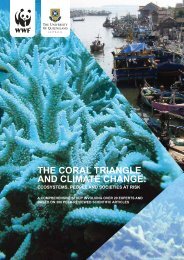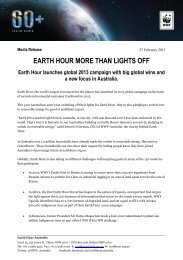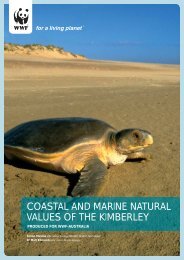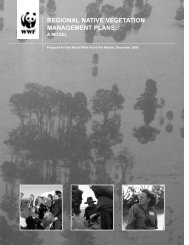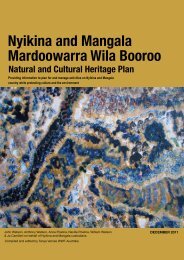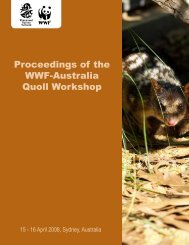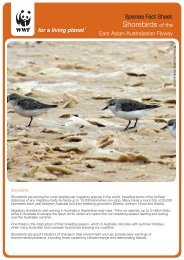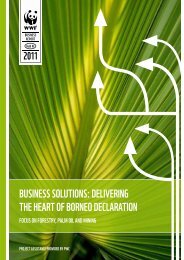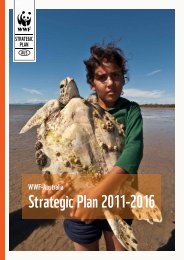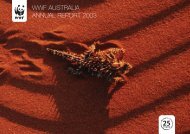Indigenous Peoples and Conservation Organizations
Indigenous Peoples and Conservation Organizations
Indigenous Peoples and Conservation Organizations
You also want an ePaper? Increase the reach of your titles
YUMPU automatically turns print PDFs into web optimized ePapers that Google loves.
The Xavante in Central Brazil 67<br />
There are indications that they have shifted their<br />
hunting preferences from species to species in<br />
the past, depending on availability. The practice<br />
of informally hunting in gardens can be more<br />
systematically exploited in order to reduce pressure<br />
on larger game populations.<br />
It is too early to say how the Xavante will fare in<br />
the future, but they are determined to pursue their<br />
objectives <strong>and</strong> are prepared to meet challenges<br />
head on. They are a fiercely independent people<br />
who underst<strong>and</strong> that their autonomy depends on<br />
how well they protect their l<strong>and</strong>. Once, that meant<br />
guarding against all outsiders. Now it means<br />
working with those who work with them to protect<br />
their l<strong>and</strong>, its resources, <strong>and</strong> their identity.<br />
Endnotes<br />
1. The author would like to thank John Butler,<br />
Nancy Flowers, Ailton Krenak, Frans<br />
Leeuwenberg, Rosa Lemos, <strong>and</strong> Kirsten Silvius<br />
for their thoughtful comments about this case<br />
study. Thanks also are extended to the Instituto<br />
Socioambiental for answering questions about<br />
the legal status of Xavante reserves.<br />
2. This case study uses the form that literate<br />
members of the community have adopted in designating<br />
this community to outsiders, <strong>and</strong> in distinguishing<br />
it from others within the Pimentel<br />
Barbosa Reserve. Variant spellings are recorded<br />
as Etéñitepa, Etenhiritipá, <strong>and</strong> Tenipá.<br />
3. The Kaxinawa of the Rio Jordão in Acre had<br />
received several grants that focused on issues<br />
important to WWF. These involved the marketing<br />
of renewable forest resources, including<br />
natural fiber h<strong>and</strong>icrafts <strong>and</strong> improved rubber<br />
processing. The mayor of Rio Blanco, the state<br />
capital, donated l<strong>and</strong> <strong>and</strong> WWF covered building<br />
costs for a small shop on the main plaza in<br />
which the Kaxinawa could sell crafts <strong>and</strong> promote<br />
their culture.<br />
4. Allocations ran approximately $25,000 to<br />
$30,000 per year during phases I <strong>and</strong> II for<br />
research <strong>and</strong> planning. Budgets for implementation<br />
ran higher. For example, WWF–Brazil<br />
requested approximately $100,000 for FY 1998<br />
to cover the cost of scientists’ salaries, two aluminum<br />
boats, motors, <strong>and</strong> fuel, <strong>and</strong> to install<br />
radio towers so that the reserve’s separate communities<br />
would be able to communicate.<br />
Approximately $70,000 was received, primarily<br />
from WWF–Sweden, to cover all expenses<br />
except for the radio communication system.<br />
5. The other major Amazonian language families<br />
are Arawak, Carib, <strong>and</strong> Tupi. Other members of<br />
the Gê language family include the Kayapó,<br />
Krahó, Suyá <strong>and</strong> Timbira (Northern Gê) <strong>and</strong> the<br />
Kaingang <strong>and</strong> Xokleng (Southern Gê). Gê languages<br />
are closely related <strong>and</strong> their speakers<br />
share many cultural features.<br />
6. The background material presented here summarizes<br />
information from several major works on<br />
the Xavante. Lopes da Silva (1992) provides an<br />
excellent historical overview. Other important<br />
sources are Chaim (1983), Flowers (1983),<br />
Graham (1995), Maybury-Lewis (1974), <strong>and</strong>



